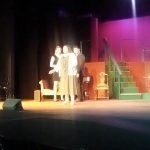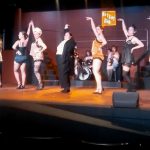Come to the Cabaret on Robinhood Lane
What good is sitting alone in your room? No good at all, not when you can come to Community Players’ production of the classic musical Cabaret.
Cabaret, with book by Joe Masteroff, music and lyrics by John Kander and Fred Ebb, and original direction by the late, legendary Harold Prince, is set in early 1930s Germany, just at the end of the Weimar Republic and just before Hitler was appointed chancellor. An American, Cliff Bradshaw, has come to Berlin to try to write but instead gets swept up into the excitement of the Kit Kat Klub, where decadence and Nazism, hedonism and violence, come together in equal measure. He begins an affair with the exotic British singer Sally Bowles and soon finds himself torn between pleasure and responsibility, obliviousness and awareness, and the competing aspects of his own sexuality. He finds his moral grounding in an older couple, Fräulein Schneider and Herr Schultz, whose relationship is threatened by anti-Semitism.
As a story, Cabaret has a long and fascinating history. It began as The Berlin Stories, an autobiographical collection by the British writer Christopher Isherwood, published in 1945, which chronicled his time in 1930s Berlin and introduced the world to Sally Bowles. In 1951 John Van Druten scripted and directed a stage adaptation, titled I Am a Camera, which starred Julie Harris as Sally and earned her the first of five Tony Awards for Best Actress.
Fifteen years later, Masteroff, Kander, and Ebb began work on a musical adaptation of Van Druten’s play. Prince, drawing on his experiences as a soldier in postwar Berlin, came up with the idea of using a cabaret, presided over by an at-first-genial-but-gradually-demonic Emcee, as a setting and symbol. The cabaret is the Kit Kat Klub, a setting within the play, but it is also a frame outside the play, a space where the Emcee can observe and comment on the characters and action and a space in which we, the audience, uncomfortably find ourselves. Opening on November 20, 1966, at the Broadhurst Theater and starring Joel Grey as the Emcee, Jill Haworth as Sally, Bert Convey as Cliff, Jack Gilford as Herr Schultz, and Lotte Lenya (Kurt Weill’s widow and herself a refugee from Nazi Germany) as Fräulein Schneider, Cabaret ran for 1,165 performances and won eight Tony Awards, including Best Musical, Best Score, Best Director, and Best Supporting Actor for Joel Grey.
In 1972 the musical was adapted for film, directed and choreographed by Bob Fosse and starring Liza Minnelli as Sally with Joel Grey reprising his role as the Emcee. There were many changes from the stage to the screen: the Fräulein Schneider-Herr Schultz plot was eliminated, along with their songs; a new subplot using characters from I Am a Camera was added; Cliff’s (now Brian’s) bisexuality was given greater emphasis; and some new songs were introduced, including three—“Mein Herr,” “Money, Money,” and “Maybe This Time”—that have been interpolated into subsequent stage productions. The film won eight Academy Awards, including Oscars for Fosse, Minnelli, and Grey.
In 1987 Prince directed a Broadway revival, again with Grey as the Emcee, that made some changes, including exploring Cliff’s bisexuality. A more significant revision, however, came in 1998, when a revival directed by Sam Mendes and Rob Marshall and starring Alan Cumming and Natasha Richardson opened at Henry Miller’s Theater and ran for 2,377 performances. This production stressed the grittiness and the decadence of the Kit Kat Klub more than previous productions and transformed the role of the Emcee into something of a stage manager, pulling the puppet strings of the other characters.
Although Community Players will be presenting the 1998 version of Cabaret, director John Poling has departed from the traditional casting for the Master of Ceremonies. Our Emcee is Ms. Kinsey Peotter. She quickly captivates the audience with her facial expressions, physicality and commanding stage presence and is worth the price of admission.
Playing Sally Bowles is Lauren Hickle who charms with a very credible British accent and truly sparkles in her song and dance numbers. On stage with Ms. Hickle at the Kit Kat Klub are fellow-dancers Kallie Bundy as Fritzie, Wendy Cottone as Rosie, Morgan Rondinelli as Lulu, Kristen Woodard as Frenchie, Jessa Hendricker as Texas, and Ashleigh Feger as Helga. Choreographer Alex Lovell has them well-polished, and costume designer Clatie Lou Fischer has them looking perfectly marvelous.
Sage Brown successfully portrays Cliff Bradshaw as a struggling American novelist in love, conflicted by his sexuality and his sensibilities. Len Childers as Cliff’s friend Ernst Ludwig and Missy Freese as Fräulein Kost are Nazi sympathizers who are easy to hate but fascinating to watch. Their scene together at the climax of Act I forcefully portends the troubles that will arrive in Act II. Natasha Warloe and Samuel James Willis give strong performances and are adorable as the elderly couple Fräulein Schneider and Herr Schultz.
Playing the Kit Kat Boys and various other roles are Brian Yager as Bobby, Allen Van Luvender as Victor, Joshua Ghantous as Hans, and Jackson Thorpe as Herman. Filling out the cast with solid performances are Maximilian James as the “Tomorrow” Boy, Candra Landers as the Customs Officer, Nick Wolf as cabaret owner, Max and ensemble members Joe Culpepper, Olivia Frullani, Patti Geske, Felicia Jiardina, Tiffany Tacket, and Jason Cook.
Bruce Parrish has provided the actors with a multi-level, functional set which serves foremost as the Kit Kat Klub, but easily transforms into other scenes such as Cliff’s apartment and even a train coach. Other members of the creative staff include Jason Cook as Assistant Director, Ali Sorensen as Music Director, Darlene Lloyd and Jay Hartlzer as Producers, Dan Virtue as Lighting Designer, and Brett Cottone as Sound Designer. Eilean Fischer is doing hair and make-up, Rosie Hauck is props master, Jessie Swiech is Dialect Coach, Mollie Perling is Fight Coordinator, Alan Wilson is Stage Manager, and Christina Dean is House Manager.
The pay-what-you-can preview performance is Thursday, November 7 with regular performances November 8-10, 15-17 and 22-24. Evening performances begin at 7:30 with Sunday matinees at 2:30. There are no Thursday performances apart from the Preview performance.
Cabaret is Rated R for adult content and language, and is not recommended for children.
—Bob McLaughlin and John Lieder





